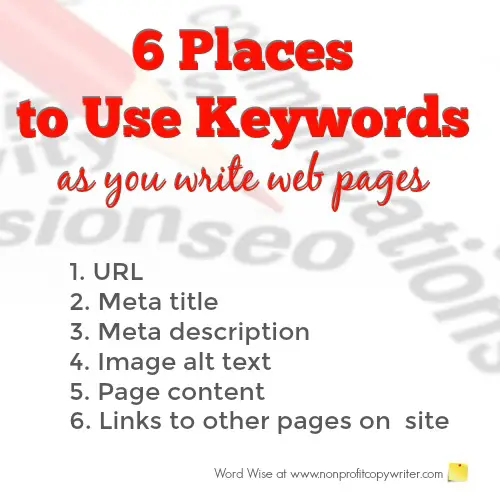Save Time: Get 5 Simple Writing Tips
you can put to use in 10 minutes
How to Use Keywords to Write Better Web Pages
Award-winning writer Kathy Widenhouse has helped hundreds of nonprofits and writers produce successful content , with 750K+ views for her writing tutorials. She is the author of 9 books. See more of Kathy’s content here.
When you know how to use keywords, you can write better web pages, blogs, and social media posts.
Keywords are terms and phrases that define a piece of content. (How keywords work.)
They help drive search engine page results rankings, so the keywords you choose can drive readers to your website, blog, or social media platform for free. (Yay!)
But how do you know which keywords to use?
How to Identify Keywords to Use on Your Pages
You can use a free tool like Google Keyword Planner to find relevant keywords for your topic. These tools return data that show you how many pages already use that term (supply) and how many users are searching for those terms (demand) – in other words, what kind of competition your page may have in search results.
Thoughtful keyword research will give you a list of keywords to use which you can divide into two kinds.
Broad keywords: generalized one word terms or short phrases that can apply to others both in your niche and outside of it, but are good choices for your website concept and its foundation content.
Long-tail keywords: two- to five-word phrases (hence the “long tail”) that are very topic-specific. These are your heavy lifters as you write individual pages or posts.
Use this step-by-step guide to identify the seed keywords for your blog or website.
6 Places to Use Keywords as You Write Web Pages or Blog Posts
As you write your content and load your page or post, use keywords in these on-page components.
- URL: the web address of the page. For example, this page’s URL is www.nonprofitcopywriter.com/use-keywords.
- Meta title tag: text that appears as the page title in the web browser. You add the title tag in the back end or header of your site (depending on your website platform) as you write the page. The best titles are 50-60 characters Longer than that will be cut off by the browser. Shorter may not be descriptive enough to differentiate from other pages.
- Meta description: a summary of the page’s content, added in the back end or header of your site. The meta description is the snippet of content that appears below a page link in your search results. Keep it to 160 characters or less, if possible, because search engines like brevity.
- Image alt text: Include your keyword so that search engines can understand what the image shows and to give readers an explanation when images cannot be found.
- Page content: Of these, the most important is page content. Use your page’s main keyword in the first 90 characters of the page and then sprinkled throughout the page. A word of warning: don’t use your page or post’s principal keyword in excess … the search engines penalize for what they call “keyword stuffing.” About once per every 150-300 words should do it nicely.
- Links to and from other pages on your site. You’ll give readers the opportunity to get more information on another page, plus you’ll repeat your keyword(s) and boost your site’s ranking.
More Web Content Writing Tips
Searching for Keywords? Use These SEO Writing Terms ...
How to Find Seed Keywords for Your Blog or Website ...
The Skinny on Thin Content: Don’t Put Rankings Over Readers ...
Contextual Links and Why You Need Them on Your Website ...
Build Backlinks and Build Your Traffic: A Beginner’s Guide ...
The 3 Types of Links Your Website Needs and How to Build Them ...
What Is SEO Content Writing? Tips for Strong Search Results ...
The Top Online Copywriting Tip ...
How Keywords Work: an overview ...
Keyword Glossary: Quick SEO Jargon at Your Fingertips ...
Long Tail Keywords: A Quick Guide to Using Unpopular Search Terms ...
It’s "Easy"! One Word That Makes Writing Powerful Key Phrases Simple...
3 Ways to Write Conversationally Online (and Off) ...
Review: Conversational Copywriting - an Online Writing Course ...
Web Writing and Writing for Print: how they are different ...
Web Content Copywriting for Newbies ...
More Online Writing Tips on our Pinterest board ...
Return from How to Use Keywords to Nonprofit Copywriter home
As an Amazon Associate I earn from qualifying purchases.
Share This Page

Named to 2022 Writer's Digest list
BEST GENRE/NICHE WRITING WEBSITE


Stop Wasting Time!
Grab your exclusive FREE guide, "5 Simple Writing Tips You Can Put to Use in 10 Minutes or Less"












